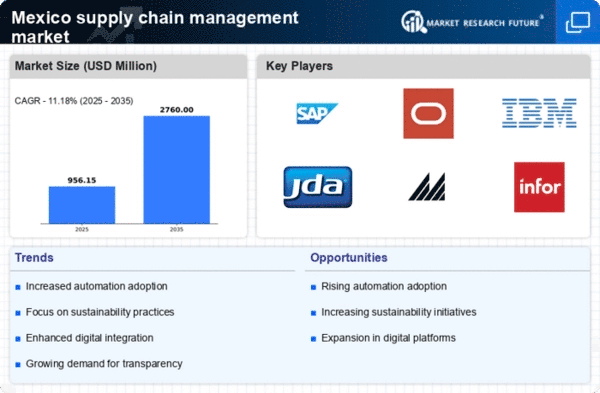Focus on Risk Management Strategies
In the current landscape, the supply chain-management market in Mexico is increasingly prioritizing risk management strategies. Companies are recognizing the importance of resilience in their supply chains, particularly in the face of potential disruptions. This has led to the implementation of diversified sourcing strategies and enhanced supplier relationships. According to recent studies, organizations that adopt robust risk management frameworks can reduce supply chain disruptions by up to 40%. As businesses strive to mitigate risks associated with geopolitical tensions and natural disasters, the emphasis on comprehensive risk management is likely to shape the future of the supply chain-management market.
E-commerce Growth and Consumer Demand
The surge in e-commerce activities in Mexico is significantly impacting the supply chain-management market. With online retail sales projected to reach $30 billion by 2025, companies are compelled to optimize their supply chains to meet rising consumer expectations for fast and reliable delivery. This shift necessitates enhanced logistics capabilities and efficient inventory management systems. As a result, businesses are investing in advanced supply chain solutions to ensure they can fulfill orders promptly. The growing demand for same-day and next-day delivery services is likely to drive further innovation within the supply chain-management market, pushing companies to adapt swiftly to changing consumer behaviors.
Technological Advancements in Logistics
The supply chain-management market in Mexico is experiencing a notable shift due to rapid technological advancements in logistics. Innovations such as automation, artificial intelligence, and the Internet of Things (IoT) are enhancing operational efficiency. For instance, the integration of AI in inventory management has been shown to reduce costs by up to 20%. Furthermore, the adoption of IoT devices allows for real-time tracking of shipments, which is crucial for maintaining supply chain integrity. As companies increasingly invest in these technologies, the supply chain-management market is likely to see improved responsiveness and reduced lead times, ultimately benefiting consumers and businesses alike.
Investment in Infrastructure Development
Infrastructure development plays a critical role in shaping the supply chain-management market in Mexico. The government has been actively investing in transportation networks, including roads, railways, and ports, to facilitate smoother logistics operations. For example, the recent expansion of the Port of Veracruz is expected to increase cargo capacity by 30%, thereby enhancing trade efficiency. Improved infrastructure not only reduces transportation costs but also shortens delivery times, which is essential for businesses aiming to remain competitive. As these developments continue, they are likely to bolster the supply chain-management market by enabling more efficient movement of goods across the country.
Emergence of Collaborative Supply Chain Models
The emergence of collaborative supply chain models is transforming the dynamics of the supply chain-management market in Mexico. Companies are increasingly recognizing the benefits of partnerships and alliances to enhance efficiency and reduce costs. By sharing resources and information, businesses can optimize their supply chains and respond more effectively to market demands. This collaborative approach is particularly relevant in sectors such as manufacturing and retail, where coordination among various stakeholders is crucial. As these models gain traction, they are expected to foster innovation and drive growth within the supply chain-management market, ultimately benefiting all participants involved.
















